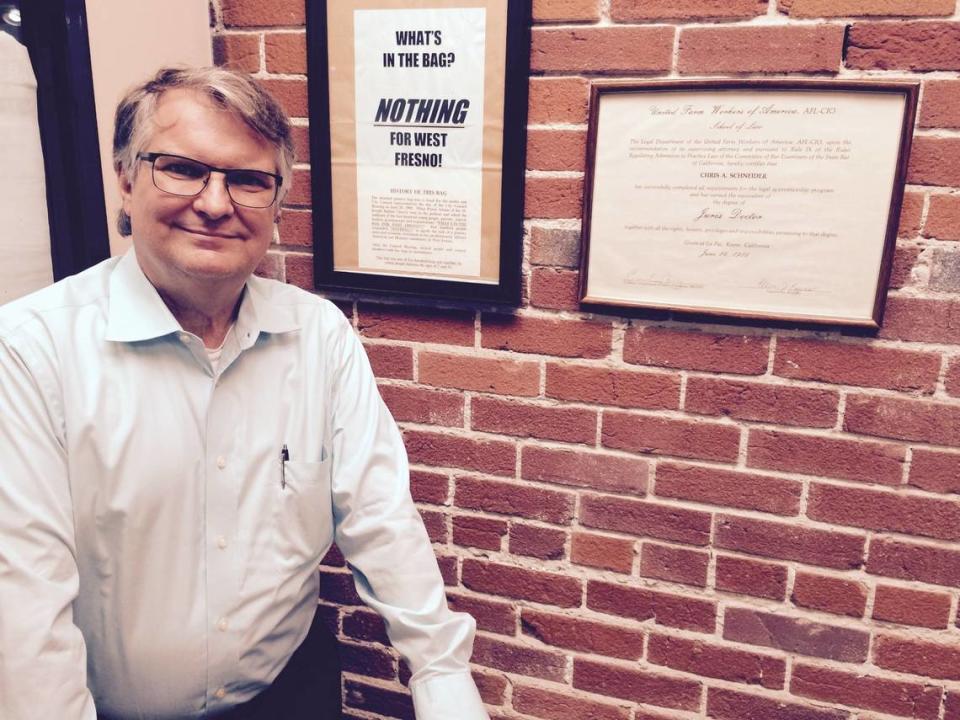Yes, César Chávez was controversial. But streets in Fresno can still be named in his honor | Opinion
The same attorney who sued to replace the name of Yokuts Valley with its previous controversial, racist and misogynistic name announced a suit against the city of Fresno to force it to rescind the creation of César Chávez Boulevard. His main argument in the new suit is, wait for it … César Chávez is a controversial name for a street.
The suit, either out of ignorance or willful avoidance of the truth, insinuates that César Chávez has no significant connection to Fresno, and certainly none to west Fresno, despite the fact that on Sept. 30, 1962, César Chávez and 150-200 farm workers gathered in southwest Fresno at the Edison Social Club Hall, then on California Avenue, and founded the National Farm Worker Association. A newspaper, El Marlcriado, became a key organizing tool for the fledgling union. West Fresno leader Les Kimber, founder, and then, publisher, of The California Advocate, a publication serving Fresno’s Black community, printed it for the union.
As to César Chávez having been, and continuing to be, controversial, I cannot argue with that. Indeed, at that meeting, workers adopted resolutions that agricultural employers and their political allies deemed controversial.
When the group of farm workers gathered in west Fresno to found their union, the law denied those workers the protection of minimum wage guaranteed to other California employees. They adopted a resolution calling for such protection.
At the time of the convention, farm workers could not collect unemployment insurance during times that work was not available for them. They called for unemployment insurance benefits.
Although industrial workers had won the right to collective bargaining decades before, federal and state law denied that same right to farm workers. They demanded the right to collective bargaining.
In short, César Chávez and the union advanced the idea that farm workers deserve the same rights as other workers. Such an idea, to an industry founded on slavery, was then, and remains today, controversial.
Many Fresno residents remain unaware of the farm worker union’s birth in west Fresno. No media outlets reported on the inauspicious gathering. No one attending the convention foresaw that, in three short years, the young organization would be thrust upon the world stage when grape workers in Delano went out on strike.
César Chávez closely aligned his actions with those of his contemporaries in the Black Freedom Movement, utilizing the same tactics of nonviolence, boycotts, marches and sit-ins. Workers sang “We Shall Overcome,” and other Freedom Movement songs, in Spanish, on strike and boycott picket lines.
In 1966 the Rev. Dr. Martin Luther King Jr. sent a telegram to César Chávez in which he stated “Our separate struggles are really one — a struggle for freedom, for dignity and for humanity.” People who opposed Dr. King’s efforts opposed César Chávez’s efforts and vice versa.
Justice is controversial. Always has been, and always will be. Those who seek justice heed the words of John Lewis: “Get in good trouble, necessary trouble, and help redeem the soul of America.” For that, they are called controversial.
Because of the “good trouble” engaged in by César Chávez and the union members, for decades now, thousands of Fresno residents who toil in the fields are guaranteed minimum wage, clean drinking water, toilets at work sites, unemployment insurance, the right to organize and bargain collectively, like other workers, and have benefited from the protection of union contracts.
Those are the controversies animating agribusiness apologists and a far-right political organization to oppose celebrating a movement for farm worker justice that began in west Fresno and grew to inspire people around the world.
Retired attorney Chris Schneider lives in west Fresno. He worked with César Chávez and the United Farm Workers from 1973 until 1989. In the 1990s, he directed Central California Legal Services’s efforts supporting southwest Fresno residents’ years-long struggle to bring the first and only major shopping center to the community.



